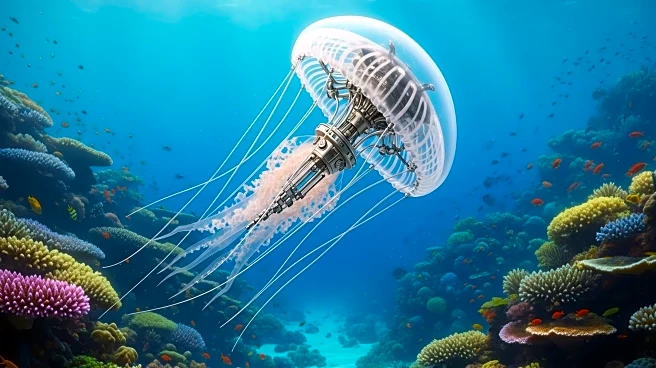What's Happening?
Researchers at CU Boulder, led by engineer Nicole Xu, have developed 'cyborg' moon jellyfish to aid in the study of oceanic changes. These jellyfish, known scientifically as Aurelia aurita, have been equipped with small electronic devices that stimulate their muscles, allowing researchers to control their movements. This innovation aims to enable the jellyfish to carry sensors that can track vital ocean data such as temperature and acidity. The jellyfish's natural ability to survive in diverse environments, including extreme ocean depths, makes them ideal for this purpose. The project, published in the journal Physical Review Fluids, highlights the potential of using living organisms as tools for scientific exploration, offering a more sustainable and cost-effective alternative to traditional robotic equipment.
Why It's Important?
The development of 'cyborg' jellyfish represents a significant advancement in marine research, particularly in the context of climate change. As ocean temperatures rise and acidity increases, understanding these changes is crucial for predicting their impact on marine ecosystems. The jellyfish's ability to explore areas that are otherwise inaccessible to humans or expensive robotic equipment could provide valuable data, enhancing our understanding of oceanic conditions. This approach not only offers a new method for data collection but also emphasizes the importance of integrating biological systems into technological solutions, potentially leading to more energy-efficient and environmentally friendly research methods.
What's Next?
The next steps for this research involve refining the technology to ensure reliable operation in natural ocean conditions, which are far less predictable than controlled lab environments. Xu's team plans to enhance the jellyfish's steering capabilities and expand the range of sensors they can carry. This could lead to broader applications, such as mapping unexplored ocean regions and monitoring environmental changes over time. The project also raises ethical considerations regarding the treatment of living organisms in research, which Xu and her team are addressing by monitoring the jellyfish for signs of stress and ensuring their well-being.
Beyond the Headlines
This project challenges traditional views on research tools by suggesting that existing natural organisms can be adapted for scientific purposes, rather than relying solely on artificial constructs. The ethical dimension of using living creatures in research is also highlighted, prompting a reevaluation of how scientific progress can be achieved responsibly. The success of this initiative could inspire similar approaches in other fields, where biological systems are leveraged to enhance technological capabilities.








